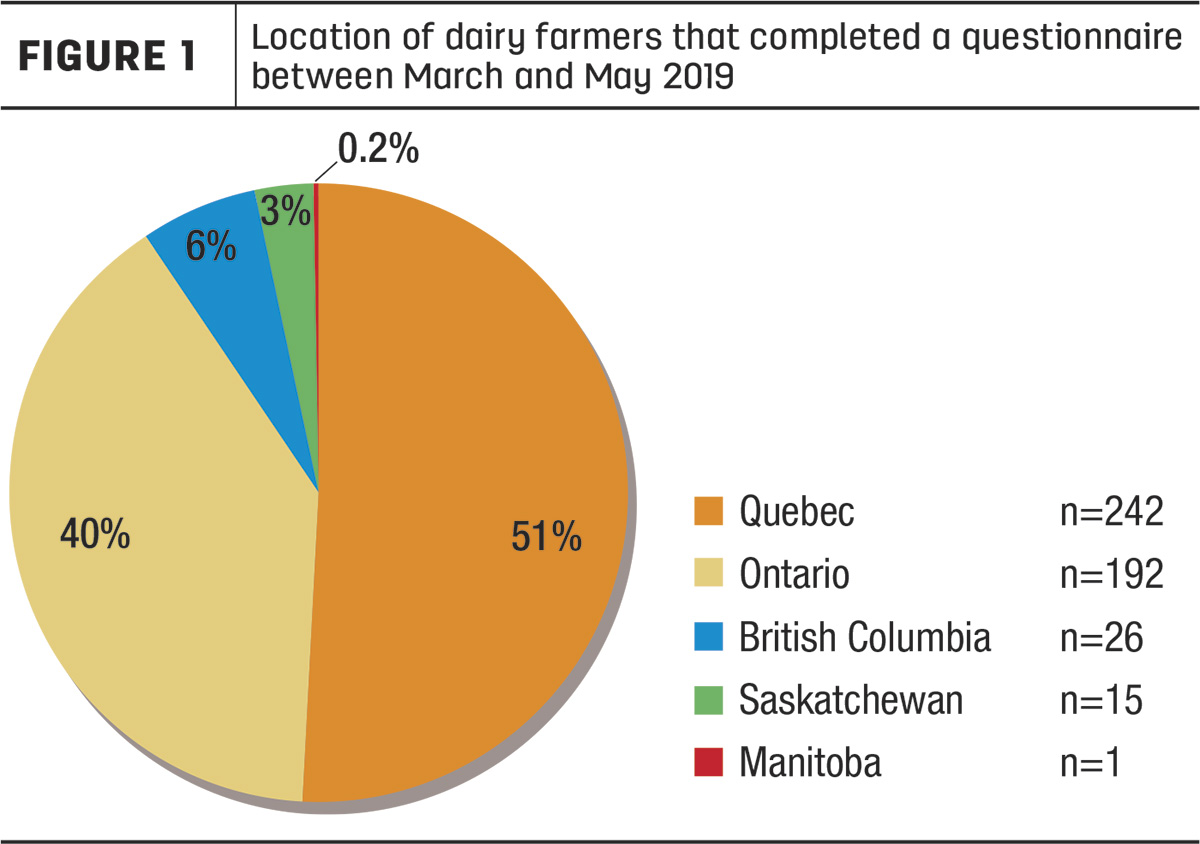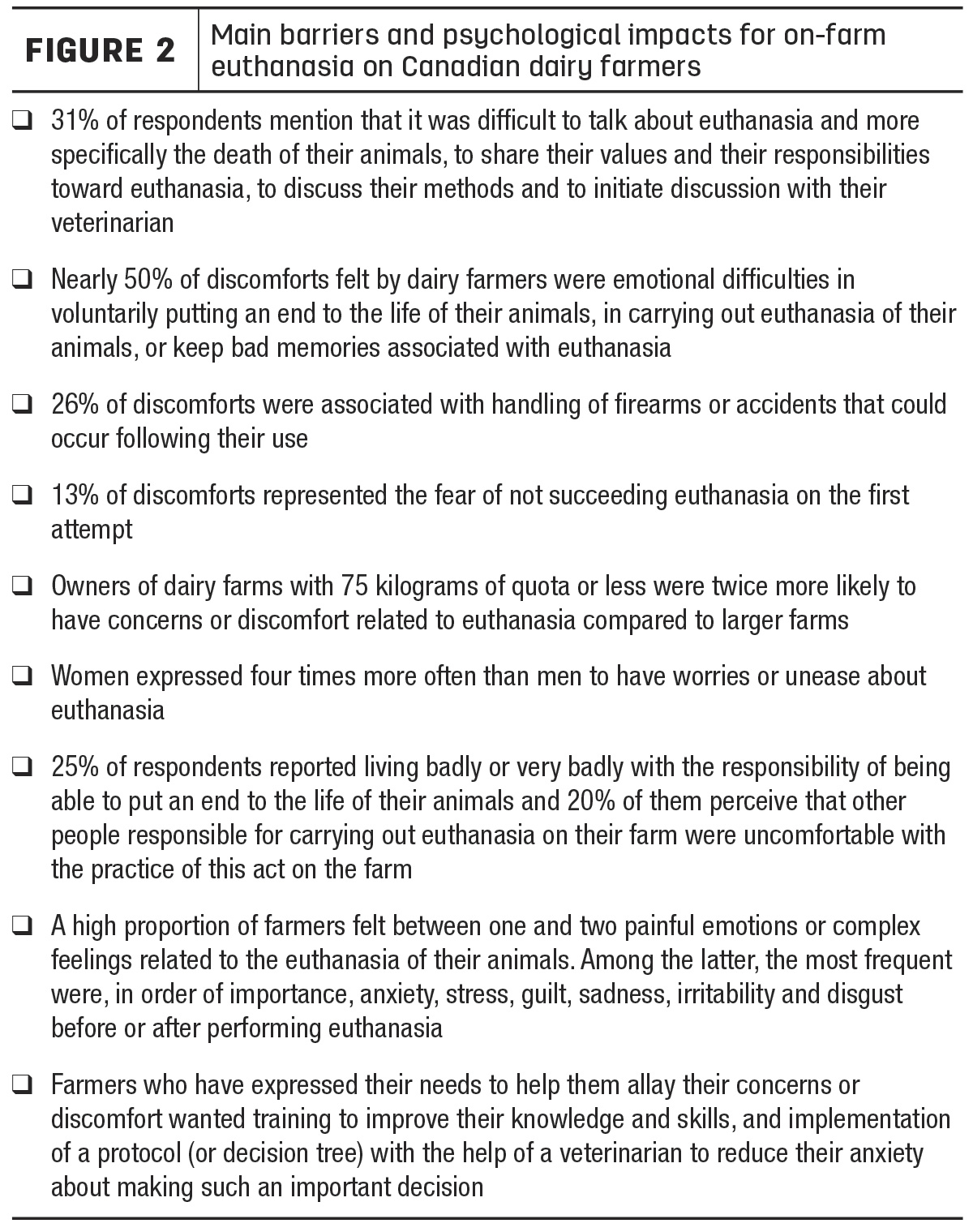This article reports the barriers to talking about euthanasia, the emotions expressed by dairy farmers about the euthanasia process of their animals, the psychological impacts of euthanasia on farmers and offers possible solutions to help them. The project was funded by Dairy Farmers of Canada, Les Producteurs de lait du Quebec and Dairy Farmers of Ontario.
The research project was carried out to gather information using an online questionnaire available to all Canadian dairy farmers between March and May 2019. A total of 476 dairy farmers started the survey, and 325 completed it. Participants were from Quebec, Ontario and the western provinces of British Columbia, Saskatchewan and Manitoba, while no participants reported being from Alberta or the Maritimes (Figure 1).

Painful emotions and complex feelings related to euthanasia
Participants who felt troubled about the responsibility of ending the lives of their animals reported painful emotions or complex feelings more often than those who felt comfortable with this responsibility (Figure 2).
 Women were more likely to report at least one painful emotion or complex feeling than men were, as were participants from smaller farms (75 kilograms of quota or less) compared to participants from larger ones (more than 75 kilograms of quota). Contrary to larger dairy farms, it is more difficult to share the responsibility for euthanasia with another person who is more comfortable with this task, thus increasing the pressure on dairy farmers owning a smaller-size dairy farm.
Women were more likely to report at least one painful emotion or complex feeling than men were, as were participants from smaller farms (75 kilograms of quota or less) compared to participants from larger ones (more than 75 kilograms of quota). Contrary to larger dairy farms, it is more difficult to share the responsibility for euthanasia with another person who is more comfortable with this task, thus increasing the pressure on dairy farmers owning a smaller-size dairy farm.
Although the majority of respondents considered that neither they nor their employees had any psychological symptoms related to euthanasia, a very high proportion of farmers felt between one and two painful emotions. Among the latter, the most frequent were, in order of importance, anxiety, stress, sadness, irritability, guilt and disgust before or after performing euthanasia. These painful emotions or complex feelings could be related to the failure of making a timely decision of euthanasia but also to a lack of confidence in the tools or the ability to perform the euthanasia adequately.
These findings clearly indicate that euthanasia is a very sensitive subject with psychological consequences for owners and their employees and that it is important not to trivialize the act of euthanasia performed on dairy farm animals. These results also highlight that farmers are sensitive and concerned about the health and well-being of their animals. These findings also illustrate that euthanasia often remains a difficult decision for dairy farmers to make and that it is necessary, more than ever, to support them in managing the euthanasia of their animals on the farm.
Recommendations
It is important to recognize the needs of farmers in order to offer solutions that can be effectively integrated on their farms. For example, it could be appropriate to improve the supply of veterinary services to euthanize animals at reasonable costs from farmers requesting this service. Training on euthanasia methods could be offered to farmers through their veterinarians. They could offer support visits to help them in their decision-making or to help them learn the correct method of euthanasia applicable on the farm. Personalized telephone or even virtual support could also be possible options. One must understand that sometimes the needs of farmers could be relational, such as the need to communicate with other farmers, or "survival," such as taking time off from their tasks and responsibilities.
Support via online and hands-on training have been shown to be beneficial to farmers and animal caretakers. The benefits of training could be even greater for farmers who are troubled by the responsibility of ending the life of their animals, including women and farmers from small dairy farms, as they were more likely to report painful emotions and complex feelings.
Offering support to dairy farmers in relation to euthanasia and animal suffering, through veterinary service and industry initiatives, could help decrease or alleviate painful emotions and complex feelings related to euthanasia.
It will be necessary to coordinate efforts between the dairy industry and veterinarians to find lasting and satisfactory solutions for all. An open and solution-oriented discussion should be undertaken as soon as possible between dairy farmers and their veterinarians to improve the management of euthanasia of dairy cattle on the farm.
This article was contributed by Luc DesCôteaux, Marjolaine Rousseau, Martine Denicourt and Marianne Villettaz Robichaud – faculty of veterinary medicine of Université de Montréal, Quebec; José Denis-Robichaud, independent researcher, Amqui, Quebec; and Anne-Marie Lamothe, independent psychologist and researcher, Terrebonne, Quebec.








